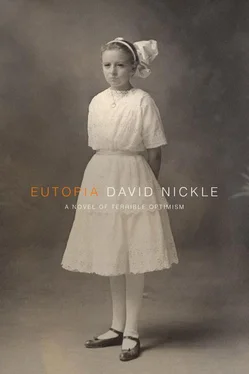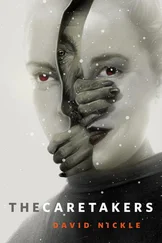It was hard to tell how many servants it took to run the estate by the time they’d made it through the gate. The grounds were filled with people.
“Looks like the whole town’s here,” said Jason, and instantly regretted it as Aunt Germaine spared him a severe look.
They walked in silence to the crowd of folk that were gathered on the lawn to the north of the house. The guests fanned out across the lawn, some sitting on blankets they’d brought, others standing and watching. A couple Jason recognized from the mill, but it was hard to tell on account of the lack of grime on their shirts and sawdust in their hair. They all stood quiet, listening to the moustachioed fellow in their midst, propped on something so he was a head higher than the tallest. Although it was sunny out, he was hatless, and his dark hair blew over a high forehead as he spoke.
“Our host,” said Germaine dryly, and nodded when Jason breathed: “Garrison Harper.”
Harper grinned as he spoke, and raised up his arms. “Rites of spring!” he shouted. “This is one of the things we’ve lost, in this new world of ours. We move through the seasons, one after another—and how do we mark them? Places on a calendar? The inching of the Earth ’round the Sun? Well not here. Not in Eliada!”
At that, a few voices shouted the name: “Eliada!” and like an echo in a canyon, more caught the gist and threw it back. Harper clapped and beamed.
Jason stopped and craned his neck to look around, and when he looked back down he saw that Aunt Germaine had moved on through the crowd. He didn’t hasten to follow—it was, to be truthful, a relief to be out of her sight.
“Some of you are new members of this community,” said Mr. Harper from his podium. “A month, two, or three, no matter. You’ve bent your back to labour through a cold and hard winter; perhaps you’ve been to see the doctors at the hospital. But you may well have asked yourself: what makes this place so fine? Where is this great community you sought when you travelled so far from family and home? Well I can only say—look around you—to the man next to you, and the one next to him.”
Jason looked to his side, his eye caught by a bright flash of red. Two men stood there. One caught Jason’s eye. Smiled.
“He,” said Mr. Harper, “is Eliada.”
Wider and wider, his teeth sharp points beneath his lips.
In the distance, Garrison Harper was on to something else—something about the ties that bind, the height of civilization.
Jason scarcely heard it. Icy sweat broke out on Jason’s brow, and he could feel an awful crawling at the base of his spine. For that instant, he was back in the quarantine, looking at that tiny, leering face. Striking at it. Running. His hand itched where he’d cut it on a scalpel, and as he looked at this fellow he also looked into the tall, skeletal Juke’s eyes at the back of the quarantine and could not look away.
Finally, it was a touch at his elbow that drew him back. The man looked away, and smiled at someone else. The spell was broken. The touch at his elbow was from an older man, dressed better than most. He was one of those servants, Jason guessed.
“Mr. Thistledown?” he asked, and Jason nodded. “Miss Harper is awaiting your company. Perhaps best to join her?”
§
The fellow did not speak again, but led him to the top of a rise to the north of the main party. Downslope was a cleared-out area that edged on the orchards. Not far off was a barn. There, a small group of people milled together. From the crowd, an iron horseshoe flew out, and as it clattered against a spike sticking out of the ground, a girl squealed. Jason waved at them, and started down.
They were near a little iron table, topped with tall glasses and a pitcher of apple cider. Miss Louise Butler was there, sipping her cider in a light blue frock and looking well, Jason thought, compared to how she seemed on the river boat; and also there was Ruth Harper—dressed as outlandishly as Jason had ever seen on a girl, wearing very baggy pants of a deep green tied near the ankle, and a white shirt like a man’s. She was beaming.
“Jason Thistledown!” she shouted, waving the horseshoes above her head as she drew up to him.
“Thank you ever so for inviting me to your party Miss Harper,” said Jason, parroting what his Aunt Germaine had told him to say when greeting his hostess. He originally was not intending to follow her advice—the way Aunt Germaine had said to say it seemed prissy and girlish and he was sure it would make him out a fool.
But no one laughed. Ruth gave a little curtsy, and she smiled in a sly way at him—the sort of way that made Jason feel that he was in on the joke, not the butt of it. The smile also washed away, at least for the moment, that memory of a tiny face like hers but not, grinning with sharp little teeth and a perverse shine in the bead-sized eye. Jason felt himself exhale, and set about figuring a greeting for Louise Butler, who stood clutching her cider to her breast and looking stricken.
Ruth set the horseshoes on the ground and stepped lightly to the table, where she lifted the pitcher and began filling a glass. “Cider, Jason?”
“Of course you remember Louise.”
“Good afternoon,” said Jason. Louise finally smiled properly.
“It’s still morning,” said Louise. “But good day, sir.”
Ruth handed the glass to Jason, then set the pitcher down. Jason took a deep swallow of the cider. It was thick and a little tart, and burned his throat.
“Too strong for you?” she asked.
“I like it fine. Like drinking a pie.” Jason took another sip. “This is quite a party your pa puts on.”
“The first of many,” said Ruth. “Father feels celebration is essential to maintaining community. This summer, he’ll have a hundred.”
Jason laughed. “He’ll run out of Sundays,” he said, and Ruth said, “He’ll just send to New York for more.”
Louise interjected: “Do you play at horseshoes, Jason?”
“I do,” said Jason. He drained the rest of his glass of cider and set it on the table.
Horseshoes was a game that Jason played quite some with his ma. When he was small, she’d driven an old rail spike into the dirt behind the house. On summer evenings after supper, the two of them would sometimes haul out a rusted stack of horseshoes and toss them over that spike until the last of daylight had bled off. The Harpers’ horseshoe set was nothing like that—the horseshoes had not a speck of rust on them, and not one of them had ever borne the weight of an actual horse.
They played four games of it before the call to lunch, and Jason won three of them without even thinking. The last one, he started thinking—and that did it. He threw one horseshoe wild, and another dropped halfway between him and the spike. Louise took that game, and at the end of it, Jason found he had to sit.
“Why Jason—what is the matter? I’ve not seen you this pale since I accused you of being the son of a gunfighter!” said Ruth.
Jason shook his head. “Nothing.”
A single vertical line formed on Ruth’s brow. “Well,” she said, “I doubt that . What have you been up to since we parted ways at the dock?”
Jason might have told it—told Ruth everything of that night, from the creature at the window to the Juke at the back of it, from the sad fate of Maryanne Leonard to the less certain fate of Dr. Andrew Waggoner—his game of cat and mouse with the murderous Dr. Bergstrom in days subsequent—were it not for the exquisite timing of Garrison Harper. He stood at the top of the rise, his coat in his arm and the sleeves of his shirt rolled past the elbow—a huge grin on his face and the breeze teasing a long dark forelock like a torn strand of flag.
Читать дальше









![David Jagusson - Fesselspiele mit Meister David [Hardcore BDSM]](/books/486693/david-jagusson-fesselspiele-mit-meister-david-har-thumb.webp)


